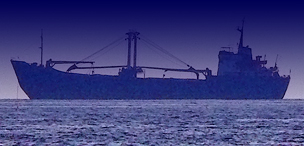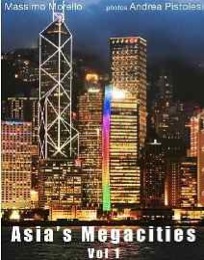Oct 2011
The Naga's Journey
28/10/11 12:04 Filed in: Logbook
Bangkok: a sunny morning. People are swimming in the pool of the apartment complex. Guests at the hotel along the river are eating breakfast on the balconies. Longtail boats, those long and narrow traditional craft now used primarily by tourists, ply the river. A couple enjoys the breeze that wafts over the swimming pool in the evening. The restaurants along the river front are brightly lit. Enormous disco boats float along the river.
You are tempted to stay inside your penthouse apartment on the river and write, like a city-dwelling hermit; sometimes writing, sometimes taking a break to swim in the pool or just to gaze out over the city. The Chinese temple across the way looks odd: only the roof of the pagoda and part of the columns decorated with dragons are visible.
Bangkok is, for the most part, under water. Just like almost 15,000 kilometers of Thailand. The economic implications are disastrous. Not to mention the human and social impact. But it all depends on your vantage point: from up on high, they all seem quite removed and distant, as if they belong to another world.
If, on the other hand, you go down there and dare to leave your own small world behind for a moment, you are immediately struck by the fact that the earth has vanished. Many of the streets have become canals, the markets, houses and shops are flooded. The shelves of the small supermarkets are empty, the water taxis that connect the city are not running. The passengers would have nowhere to get off. All of this is, in fact, just a short distance away.
Now a creeping feeling begins to insinuate itself. Your world might very soon, in the next few hours or days, become a prison from which you will be forced to leave to look for food and water. The lights may go out. Suddenly, being up above it all means that you will discover what it is like to climb up thirty flights of stairs.
It seems like a script from a horror film. Nevertheless, the idea haunts you. You get an immediate sense of the fraility of a global system whose disasters can be traced directly to a sacrilegious mismanagement of nature.
Then you think of the even more fragile Asian system, which was perhaps too quickly hailed as the up and coming power of the new century that would see the decline of the West. Skyscrapers here, more often than not, reflect a pretense of power rather than true strength. It is a strange paradox that Bangkok is sinking under the weight of its skyscrapers
The human factor here is too often marginalized: social inequality and decay add to the problems. Then they are carried away with the water.
Finally, though only because it takes time to come to the unpleasant reality at hand, you realize just how weak you are yourself. Most of the Thai people that you meet in front of their flooded homes or businesses smile at you. "Mai pen rai" says someone, with an air of peaceful resignation.
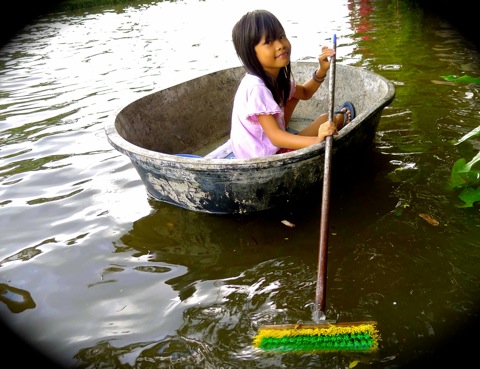
Comparing the way you feel with the way they behave is a little disquieting. You see your flaws and weaknesses, your detachment from reality.
I haven't believed in coincidence for a long time. The Naga has reaffirmed my disbelief; this seven headed serpent which represents the spirit of water in Asian myths. It can be as benevolent as it can be vindicative and devastating. At the moment I am translating a book by the Thai author, Tew Bunnag, titled The Naga's Journey (the Italian edition to be published in 2012 by Metropoli d’Asia). The Naga, in the form of a disastrous flood which wreaks havoc on the fragility of Bangkok and its populace - "Fragile does not mean weak, it means that it breaks easily" says Bunnag - is the underlying character of the book.
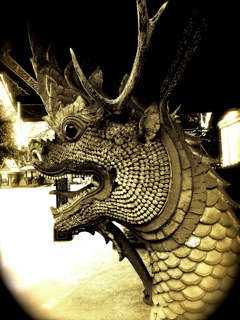
In the meantime, another day has passed. A couple enjoy the breeze.The restaurants are enlighted. At least here, the chance and the chaos are still covered beneath the water, as is the Naga.
A video in Thai with English subtitles that explians, in the Thai fashion, what is happening and why. It is very good in its way.
You are tempted to stay inside your penthouse apartment on the river and write, like a city-dwelling hermit; sometimes writing, sometimes taking a break to swim in the pool or just to gaze out over the city. The Chinese temple across the way looks odd: only the roof of the pagoda and part of the columns decorated with dragons are visible.
Bangkok is, for the most part, under water. Just like almost 15,000 kilometers of Thailand. The economic implications are disastrous. Not to mention the human and social impact. But it all depends on your vantage point: from up on high, they all seem quite removed and distant, as if they belong to another world.
If, on the other hand, you go down there and dare to leave your own small world behind for a moment, you are immediately struck by the fact that the earth has vanished. Many of the streets have become canals, the markets, houses and shops are flooded. The shelves of the small supermarkets are empty, the water taxis that connect the city are not running. The passengers would have nowhere to get off. All of this is, in fact, just a short distance away.
Now a creeping feeling begins to insinuate itself. Your world might very soon, in the next few hours or days, become a prison from which you will be forced to leave to look for food and water. The lights may go out. Suddenly, being up above it all means that you will discover what it is like to climb up thirty flights of stairs.
It seems like a script from a horror film. Nevertheless, the idea haunts you. You get an immediate sense of the fraility of a global system whose disasters can be traced directly to a sacrilegious mismanagement of nature.
Then you think of the even more fragile Asian system, which was perhaps too quickly hailed as the up and coming power of the new century that would see the decline of the West. Skyscrapers here, more often than not, reflect a pretense of power rather than true strength. It is a strange paradox that Bangkok is sinking under the weight of its skyscrapers
The human factor here is too often marginalized: social inequality and decay add to the problems. Then they are carried away with the water.
Finally, though only because it takes time to come to the unpleasant reality at hand, you realize just how weak you are yourself. Most of the Thai people that you meet in front of their flooded homes or businesses smile at you. "Mai pen rai" says someone, with an air of peaceful resignation.

Comparing the way you feel with the way they behave is a little disquieting. You see your flaws and weaknesses, your detachment from reality.
I haven't believed in coincidence for a long time. The Naga has reaffirmed my disbelief; this seven headed serpent which represents the spirit of water in Asian myths. It can be as benevolent as it can be vindicative and devastating. At the moment I am translating a book by the Thai author, Tew Bunnag, titled The Naga's Journey (the Italian edition to be published in 2012 by Metropoli d’Asia). The Naga, in the form of a disastrous flood which wreaks havoc on the fragility of Bangkok and its populace - "Fragile does not mean weak, it means that it breaks easily" says Bunnag - is the underlying character of the book.

In the meantime, another day has passed. A couple enjoy the breeze.The restaurants are enlighted. At least here, the chance and the chaos are still covered beneath the water, as is the Naga.
A video in Thai with English subtitles that explians, in the Thai fashion, what is happening and why. It is very good in its way.
0 Comments
Flows
20/10/11 13:08 Filed in: Logbook
I was marooned on a ghost ship. Since my last post that story has been resolved. The sailors were paid, maybe because the post was used as a bargaining tool.
In the meantime, I spent a few months in the west and no stories appeared on the Bassifondi blog. Not that there aren’t any stories in the West. Quite the contrary, the bottom rung of society is getting longer, it’s becoming a swamp where ideas stagnate and rot. It’s as though there were something in the air paralysing ideas. As though our minds were too busy thinking only about the pros and cons of someone or something. It all inevitably comes back to that. Like a labyrinth that has lots of entrances but the exit has yet to be opened.
But enough already. I came back East. Not that there are no crises in the East. Quite the contrary, crises often take on catastrophic, biblical proportions in this part of the world. And beyond the images of development, there are always some shady areas. It’s just that here you feel part of a flow, a current of ideas, far-off horizons can be perceived and people are curious to get there and see for themselves.
This is going on, for instance, at a small Bangkok art gallery which is holding an exhibition in which artists from India of Hindu, Muslim and Christian religion interpret Ramayana. According to the Indian-American curator, Siddharta V. Shah, it’s a way of materialising Jungian archetypes and overcoming the clash between culture and religion. The possibility may be slim, but at least it’s there.
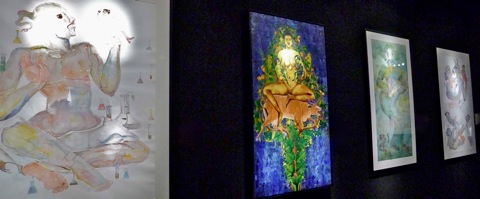
In Singapore, colossal projects that change the very concept of urban planning are taking shape, such as Gardens by the Bay.
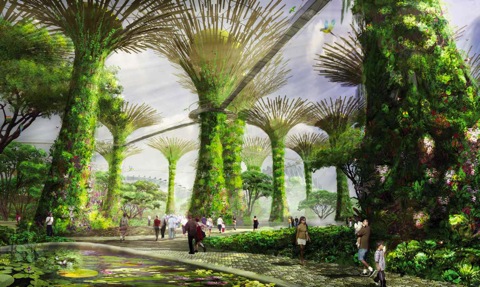
Other, less evident but still striking artistic comingling is also going on. Such as the amazing calligraphic images by Frenchwoman Fabienne Verdier, exhibited at the Art Plural Gallery.
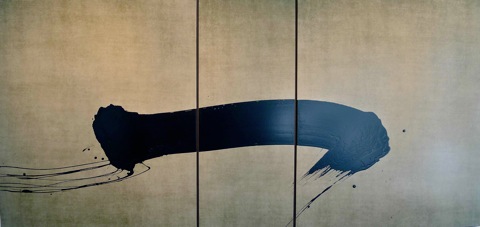
So, in the end, perhaps we can still hope that this flow will reach the West, so that we can take to the seas again.
In the meantime, I spent a few months in the west and no stories appeared on the Bassifondi blog. Not that there aren’t any stories in the West. Quite the contrary, the bottom rung of society is getting longer, it’s becoming a swamp where ideas stagnate and rot. It’s as though there were something in the air paralysing ideas. As though our minds were too busy thinking only about the pros and cons of someone or something. It all inevitably comes back to that. Like a labyrinth that has lots of entrances but the exit has yet to be opened.
But enough already. I came back East. Not that there are no crises in the East. Quite the contrary, crises often take on catastrophic, biblical proportions in this part of the world. And beyond the images of development, there are always some shady areas. It’s just that here you feel part of a flow, a current of ideas, far-off horizons can be perceived and people are curious to get there and see for themselves.
This is going on, for instance, at a small Bangkok art gallery which is holding an exhibition in which artists from India of Hindu, Muslim and Christian religion interpret Ramayana. According to the Indian-American curator, Siddharta V. Shah, it’s a way of materialising Jungian archetypes and overcoming the clash between culture and religion. The possibility may be slim, but at least it’s there.

In Singapore, colossal projects that change the very concept of urban planning are taking shape, such as Gardens by the Bay.

Other, less evident but still striking artistic comingling is also going on. Such as the amazing calligraphic images by Frenchwoman Fabienne Verdier, exhibited at the Art Plural Gallery.

So, in the end, perhaps we can still hope that this flow will reach the West, so that we can take to the seas again.
teaser : fabienne Verdier : flux: un film de philippe chancel from philippe chancel on Vimeo.


